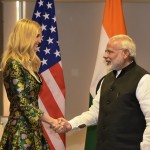Ivanka Trump recently ended a successful visit to India where she acted and was granted the status of America’s chief diplomat at a global summit while the man who actually occupies the position appeared to be in a fresh bout of trouble with the White House.
She headlined the Global Entrepreneurship Summit along with Prime Minister Narendra Modi, speaking about gender parity and the need for governments to promote women in the workplace. Exuding an air of confidence and authority, she was up with the jargon of empowerment and how countries can raise productivity by including more women in the work force.
Secretary of State Rex Tillerson did not accompany the first daughter to Hyderabad nor did he apparently allow senior State Department officials to join the delegation in a telling indication of the state of play in Washington.
Tillerson’s future as the top U.S. diplomat has been a matter of keen speculation for months, given the regular and open policy disagreements with President Donald Trump. For reasons both of his own making and not, Tillerson has steadily lost clout in Trump’s inner circle.
Every time he locks horns with the president others quickly occupy the space he vacates because politics, like nature, abhors a vacuum. His departure is all but certain – only the timing is unknown.
Some have even speculated that Ivanka could eventually get a more important position in the administration at a future date with a more specific mandate. In other words, the first daughter could become even more important in the scheme of things.
Questions have been raised whether Modi as head of government should have hosted Ivanka whose official position is “special adviser” to her father. She obviously is not Modi’s equal in terms of protocol but received treatment as if she were. Should the rulebook have been followed?
But rulebooks don’t have good answers when dealing with a U.S. president as unconventional as Trump. He has blurred the lines and set aside standard protocol so often, it has begun to feel routine after 11 months. And diplomacy has to adapt to suit the times.
Ivanka as “special advisor” to the president has a position nebulous and stretchable enough to suit many occasions. Her father has relied on her counsel on social issues, from paid leave for new parents to the rights of the LGBTQ community. It is said that Ivanka acts as a check on her impulsive father, trying to keep him from going too far down the politically incorrect line.
That family members occupy a special position in the Trump White House is not a secret. Their influence has been apparent on foreign policy issues, ranging from China to the Israeli-Palestinian dispute.
A realist perspective therefore would find no fault with the “extra special” treatment Ivanka got from the Indian government at the GES summit. The gains from a Modi-Ivanka tete-a-tete should be obvious.
Diplomats from other countries figured out early that first daughter Ivanka and her husband Jared Kushner had the influence on Trump that no one else did or could. If they wanted to affect U.S. policy in a certain direction, they had to find a way to the couple.
The Chinese ambassador in Washington was the able to use his connections to Henry Kissinger to get to Kushner earlier this year to smoothen the path to a summit between Trump and Xi Jinping.
The couple are an effective backchannel in an administration that is often chaotic and where normal channels are either dry or do not have the clearance to speak for the president.
Besides, the U.S. bureaucracy has demonstrated again and again, including under this rule-breaking president, that it’s wedded to old positions on nearly every foreign policy issue. It is Trump – at least in the case of South Asia – who has spoken out against the norm.
Most recently, the State Department bureaucracy supported the British candidate Christopher Greenwood for the last seat in the International Court of Justice against the Indian candidate, Dalveer Bhandari. When India lobbied the White House and questioned U.S. policy, things rapidly changed forcing other permanent members of the UN Security Council to rethink their positions. It is said that a member of Trump’s family was also contacted.
It was diplomacy 101 – India did what it needed to secure its interest. Diplomatic outreach to “Javanka”—as the couple are popularly known — is now considered part of the basic drill.
Ivanka and Jared have accompanied Trump on official foreign trips, sitting side-by-side cabinet members. If engaging them gets the message across, it would be foolish to ignore them.
Seema Sirohi is a Washington-based analyst and a frequent contributor to Gateway House: Indian Council on Global Relations. Seema is also on Twitter, and her handle is @seemasirohi
This article was exclusively written for Gateway House: Indian Council on Global Relations. You can read more exclusive content here.
For interview requests with the author, or for permission to republish, please contact outreach@gatewayhouse.in.
© Copyright 2017 Gateway House: Indian Council on Global Relations. All rights reserved. Any unauthorized copying or reproduction is strictly prohibited.


